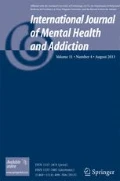References
An, J., Sun, Y., Wan, Y., Chen, J., Wang, X., & Tao, F. (2014). Associations between problematic internet use and adolescents' physical and psychological symptoms: possible role of sleep quality. Journal of Addiction Medicine, 8(4), 282–287. doi:10.1097/adm.0000000000000026.
Demetrovics, Z., Szeredi, B., & Rózsa, S. (2008). The three-factor model of internet addiction: the development of the problematic internet use questionnaire. Behavior Research Methods, 40(2), 563–574. doi:10.3758/BRM.40.2.563.
Fernandez-Villa, T., Molina, A. J., Garcia-Martin, M., Llorca, J., Delgado-Rodriguez, M., & Martin, V. (2015). Validation and psychometric analysis of the internet addiction test in Spanish among college students. BMC Public Health, 15, 953. doi:10.1186/s12889-015-2281-5.
Huang, Z., Wang, M., Qian, M., Zhong, J., & Tao, R. (2007). Chinese internet addiction inventory: developing a measure of problematic internet use for Chinese college students. Cyberpsychology & Behavior, 10(6), 805–811. doi:10.1089/cpb.2007.9950.
Kelley, K. J., & Gruber, E. M. (2010). Psychometric properties of the problematic internet use questionnaire. Computers in Human Behavior, 26(6), 1838–1845. doi:10.1016/j.chb.2010.07.018.
Kelley, K. J., & Gruber, E. M. (2013). Problematic internet use and physical health. Journal of Behavioral Addictions, 2(2), 108–112. doi:10.1556/JBA.1.2012.016.
Király, O., Nagygyörgy, K., Koronczai, B., Griffiths, M. D., & Demetrovics, Z. (2015). Assessment of problematic internet use and online video gaming. In E. Aboujaoude & V. Starcevic (Eds.), Mental Health in the Digital Age: Grave Dangers, Great Promise (pp. 46–68). Oxford: Oxford University Press.
Koronczai, B., Urbán, R., Kökönyei, G., Paksi, B., Papp, K., Kun, B., et al. (2011). Confirmation of the three-factor model of problematic internet use on off-line adolescent and adult samples. Cyberpsychology, Behavior, and Social Networking, 14, 657–664. doi:10.1089/cyber.2010.0345.
Koronczai, B., Kökönyei, G., Urbán, R., Kun, B., Pápay, O., Nagygyörgy, K., et al. (2013). The mediating effect of self-esteem, depression and anxiety between satisfaction with body appearance and problematic internet use. American Journal of Drug and Alcohol Abuse, 39(4), 259–265. doi:10.3109/00952990.2013.803111.
Lam, L. T. (2014). Internet gaming addiction, problematic use of the internet, and sleep problems: a systematic review. Current Psychiatry Reports, 16(4), 444. doi:10.1007/s11920-014-0444-1.
Li, X., Li, D., & Newman, J. (2013). Parental behavioral and psychological control and problematic internet use among Chinese adolescents: the mediating role of self-control. Cyberpsychology, Behavior, and Social Networking, 16(6), 442–447. doi:10.1089/cyber.2012.0293.
Mazhari, S. (2012a). Association between problematic internet use and impulse control disorders among Iranian university students. Cyberpsychology, Behavior, and Social Networking, 15(5), 270–273. doi:10.1089/cyber.2011.0548.
Mazhari, S. (2012b). The prevalence of problematic internet use and the related factors in medical students, Kerman, Iran. Addiction & Health, 4(3–4), 87–94.
Muthén, L. K., & Muthén, B. O. (1998-2007). Mplus User’s Guide. Fifth Edition. Los Angeles, CA: Muthén & Muthén.
Pontes, H. M., Patrão, I. M., & Griffiths, M. D. (2014). Portuguese validation of the internet addiction test: an empirical study. Journal of Behavioral Addictions, 3(2), 107–114.
SPSS Inc (2007). SPSS for Windows, Version 16.0. Chicago: SPSS Inc..
Yau, Y. H., Potenza, M. N., & White, M. A. (2013). Problematic internet use, mental health and impulse control in an online survey of adults. Journal of Behavioral Addictions, 2(2), 72–81. doi:10.1556/jba.1.2012.015.
Young, K. S. (1998). Caught in the Net: How to recognize the signs of Internet addiction and a winning strategy for recovery. New York: Wiley.
Zahodne, L. B., Susatia, F., Bowers, D., Ong, T. L., Jacobson, C. E. T., Okun, M. S., et al. (2011). Binge eating in Parkinson's disease: prevalence, correlates and the contribution of deep brain stimulation. Journal of Neuropsychiatry and Clinical Neurosciences, 23(1), 56–62. doi:10.1176/appi.neuropsych.23.1.56.
Acknowledgments
This work was supported by the Hungarian Scientific Research Fund (grant numbers: K83884 and K111938). Gyöngyi Kökönyei and Zsolt Demetrovics acknowledge financial support of the János Bolyai Research Fellowship awarded by the Hungarian Academy of Sciences. Beatrix Koronczai acknowledge financial support of the EU Science and Technology Fellowship Programme China.
Author information
Authors and Affiliations
Corresponding author
Ethics declarations
Conflict of Interest
Beatrix Koronczai, Gyöngyi Kökönyei, Róbert Urbán, Orsolya Király, Katalin Nagygyörgy, Katalin Felvinczi, Mark D. Griffiths, Zheng Huang and Zsolt Demetrovics declare that they do not have any interests which could constitute a real, potential or apparent conflict of interest with respect to his/her involvement in the publication.
Funding
The authors also declare that they do not have any financial or other relations (e.g. directorship, consultancy or speaker fee) with companies, trade associations, unions or groups (including civic associations and public interest groups) that may gain or lose financially from the results or conclusions in the study. Sources of funding are acknowledged.
Rights and permissions
About this article
Cite this article
Koronczai, B., Kökönyei, G., Urbán, R. et al. Confirmation of the Chinese Version of the Problematic Internet Use Questionnaire Short Form (PIUQ-SF). Int J Ment Health Addiction 15, 191–197 (2017). https://doi.org/10.1007/s11469-016-9664-4
Published:
Issue Date:
DOI: https://doi.org/10.1007/s11469-016-9664-4

